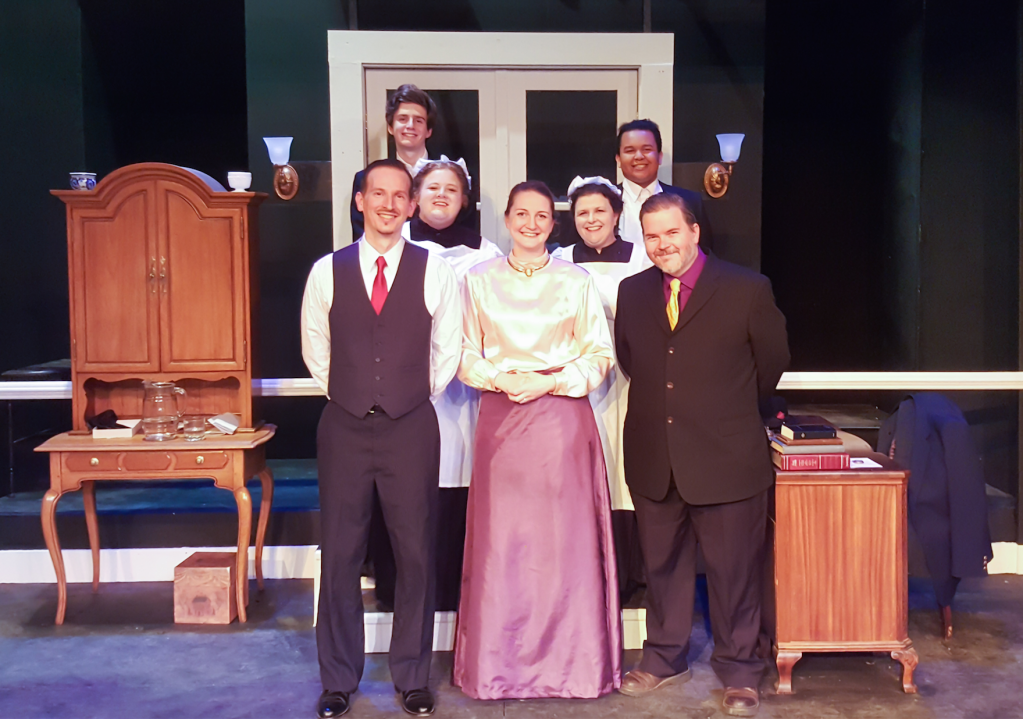Waterworks’ play ‘Gaslight’ review
Published 8:55 am Tuesday, April 17, 2018

- Pictured are, from left, front row, Greg Tsigaridas as Jack Manningham, Charlotte Trant as Bella Manningham and Billy Tucker as Inspector Rough; middle row, Sarabeth Roberts as Nancy and Mary Jo Stockton as Elizabeth; back row, Christian Huggard and Krishon Preston as policemen.
BY IAN DANIELSEN
Assistant Professor of Social Work, Longwood University
In his directorial debut, Don Blaheta has led cast and crew to a formidable and gripping success with Waterworks’ production of Patrick Hamilton’s “Gaslight.”
Trending
Set in late 19th century Victorian London, “Gaslight” is a story of psychological intimidation, a sort of case study in predatory power in intimate relationships, and culturally speaking, in a man’s world.
As lead characters Bella and Jack Manningham, Charlotte Trant and Greg Tsigaridas’s tempered pace lends great plausibility to their toxic relationship. Overstating their lines would have made their parts melodramatic caricatures— the diabolical villain overpowering the helpless damsel. Instead, Tsigaridas’ even and understated approach make his ploys on Bella creep, pulse and needle.
They both succeed in letting their parts inhale and exhale, contract and release, embracing the dramatic tension essential to the production, and finding depth.
Trant as Bella convincingly reveals early in Act One that she is defined by struggle. She is initially convinced that the struggle is one of her own self-doubt, though the audience knows, it is indeed rooted in her husband’s compulsively, venomously, exploiting her sensitivity. Indeed, by the time Tsigaridas as Jack escalates to giving Bella his first gale-strength tirade, we become fully immersed in anxious, anticipatory tension.
Throughout, he captures a sort of “genteel beast” dynamic, alternating between compassion and intimidation, interspersed with outright trickery, all intended to make Bella gradually unravel. Perhaps playwright Patrick Hamilton’s aim was to portray, in this obscenely insidious character, the point that his dynamics of intimidation were actually part of the status quo of Victorian Britain, perhaps not as flagrant, but certainly just as established. And one wonders if this was selected as a parable that also tragically applies to today’s times.
Billy Tucker, as the clever and persistent Inspector Rough, serves brilliantly as the “anti- Jack,” representing an unexpected lifeboat for Bella, one that suggests that perhaps her madness is not so self-imposed. One of Tucker’s delicious gifts as an actor is his precise elocution. His measured and expressive intonation is so intentionally- crafted, his interpretation of Rough is a delight to listen to as well as to watch.
Trending
Both male lead characters are driven, leaving the character of Bella in an inevitably passive position through each’s relentless behavior. The difference between the two is that Jack’s cravenness is toward greed while Rough’s is toward justice. This is largely a story of “man versus man,” and again, in a man’s world – Jack’s criminal intellect versus Rough’s criminological one.
In Act Two, the viewer is therefore left to wonder about Bella. Does this turn out to be a man’s story? Does the struggle between these men hijack her own struggle? This question is indeed resolved, but in the spirit of sparing readers the spoiler, I leave you to see this resolution in person. I will only offer the hint that both Rough and Bella gift us with a monologue in Act Three that I will remember fondly as a soliloquys, owing to their deft interpretations and precise acting skills.
Minor characters Elizabeth and Nancy, played by Mary Jo Stockton and Sarabeth Roberts respectively, perform their parts persuasively, serving small but important roles in the grand scheme. Blaheta’s set design is sparse, tasteful, and accurate to the date and setting, discreetly accommodating this character-driven production.
A prime indicator of a strong theatre production is one in which the viewer is treated to two headspaces at once – one which suspends disbelief and lets the characters come alive, the other which delights in the playwright’s artfully- penned dialogue. Waterworks’ “Gaslight” most certainly does its part to offer the audience both joys.
Someone close to the show told me that Blaheta painstakingly watched the show’s action from nearly every seat in the theater during rehearsals, to experience it from every possible point of view. This doubled-down commitment to integrity, coupled with Waterworks’ intimate studio theater setting, join to ensure that there is truly no bad seat in the house.





